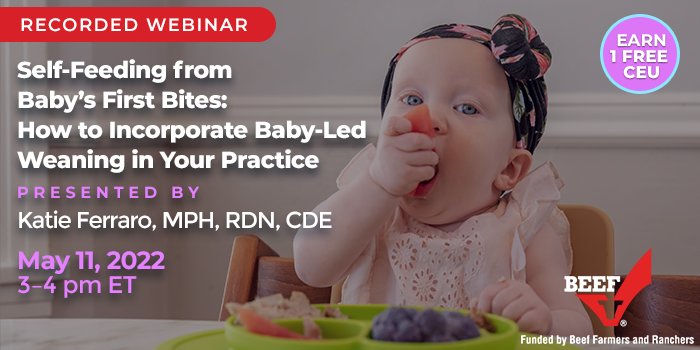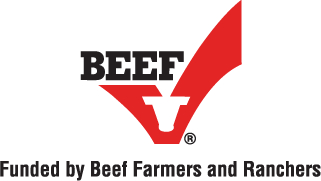Recorded Webinar: Self-Feeding from Baby’s First Bites: How to Incorporate Baby-Led Weaning in Your Pediatric Nutrition Practice

This webinar was presented on Wednesday, May 11, 2022 from 3-4 p.m. ET.
Are you looking to incorporate a baby-led approach to starting solid foods in your pediatric nutrition practice? If the last thing you learned about infant feeding was in your Lifecycle Nutrition class, it’s time to take a closer look at baby-led weaning!
Baby-led weaning (BLW) is a practical and hands-on approach to starting solid foods. Research shows that it’s a safe and effective alternative to traditional spoon-feeding.1,2,3 Parents, caregivers, and health care practitioners are increasingly interested in BLW and RDs need to be involved in this conversation.
Join Katie Ferraro, MPH, RDN, CDE to learn about baby-led weaning and how you can incorporate this philosophy and approach in your pediatric nutrition practice (...or with your own family!) Katie will cover the evidence that supports a baby-led approach to starting solid foods and address concerns related to nutrient adequacy and safety. She will share tips and best practices to successfully implement a BLW approach, including how to incorporate a variety of foods, textures, and preparations at different ages and stages of development throughout a baby’s first year.
Learning Objectives
After completing this activity, nutrition professionals will be better able to:
- Detail the body of current, peer-reviewed research that supports a baby-led approach to starting solid foods.
- Assess a baby’s readiness to feed and identify potential nutrient gaps and safety concerns commonly associated with the transition to solid foods.
- Provide recommendations to clients, parents, and caregivers for ideal first foods, introduction of potentially allergenic foods, and texture progression for babies aged 6-12 months.
1. Brown, A., Jones, S.W. & Rowan, H. Baby-Led Weaning: The Evidence to Date. Curr Nutr Rep 6, 148–156 (2017). https://doi.org/10.1007/s13668-017-0201-2
2. Brown A. (2018). No difference in self-reported frequency of choking between infants introduced to solid foods using a baby-led weaning or traditional spoon-feeding approach. Journal of human nutrition and dietetics: the official journal of the British Dietetic Association, 31(4), 496–504. https://doi.org/10.1111/jhn.12528
3. Cameron, S. L., Taylor, R. W., & Heath, A. L. (2015). Development and pilot testing of Baby-Led Introduction to Solids--a version of Baby-Led Weaning modified to address concerns about iron deficiency, growth faltering and choking. BMC pediatrics, 15, 99. https://doi.org/10.1186/s12887-015-0422-8
Additional Information

Katie Ferraro, MPH, RDN, CDE, is a Registered Dietitian specializing in baby-led weaning at her Instagram handle, @babyledweanteam, and a mom of seven kids. She teaches nutrition at San Diego State University and hosts the top-rated parenting podcast “Baby-Led Weaning Made Easy.”
Katie runs the largest digital community dedicated to BLW and she helps parents, caregivers, and health care providers give their babies a safe start to solid foods using baby-led weaning.
Katie Ferraro, MPH, RDN, CDE, has the following relevant disclosures to report: she is the owner of The Fortified Family, Inc. and sells digital baby-led weaning education programs for parents and health care providers. She receives other financial support from Thrive Training Institute, ezpz, Butcher Box, Nomi, Puffworks, and Bapron Baby. She is a consultant to the National Cattlemen's Beef Association, a contractor to the Beef Checkoff, the California WIC Association, and other state WIC Associations, and she has received honoraria from the National Cattlemen's Beef Association, a contractor to the Beef Checkoff. She certifies that no conflict of interest exists. View our disclosure policy.
National Cattlemen’s Beef Association (NCBA) is a trade association that represents America’s beef farmers and ranchers. NCBA is the largest contractor to the Beef Checkoff, which is a national promotion, research, and education program, focused on increasing beef demand and governed by the Cattlemen’s Beef Board. The nation’s farmers and ranchers, as well as importers of beef, pay for this program through assessments of $1 per head on the sale of live domestic or imported cattle, in addition to a comparable assessment on imported beef and beef products. The NCBA supports Checkoff-funded scientific research to better understand beef’s role in healthy diets and provides evidence-based education and resources for health professionals and consumers to help them enjoy beef as part of a healthy diet.
Learn more about the NCBA’s nutrition programming and outreach by visiting: https://www.beefitswhatsfordinner.com/nutrition/beef-in-the-early-years.
National Cattlemen’s Beef Association, a Contractor to the Beef Checkoff, has been approved by the CDR to offer 1.0 CPEU for this webinar.
Available Credit
- 1.00 CDR

 Facebook
Facebook X
X LinkedIn
LinkedIn Forward
Forward